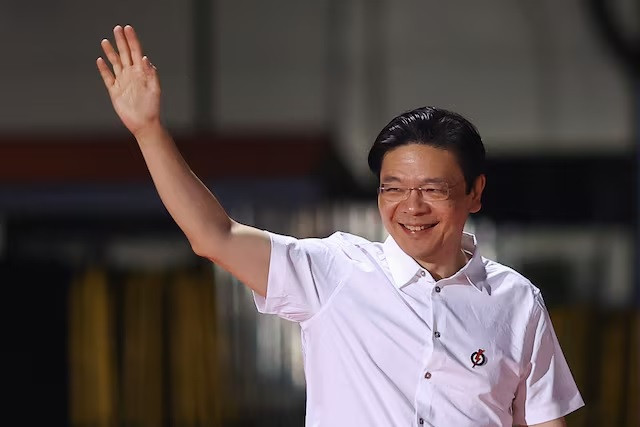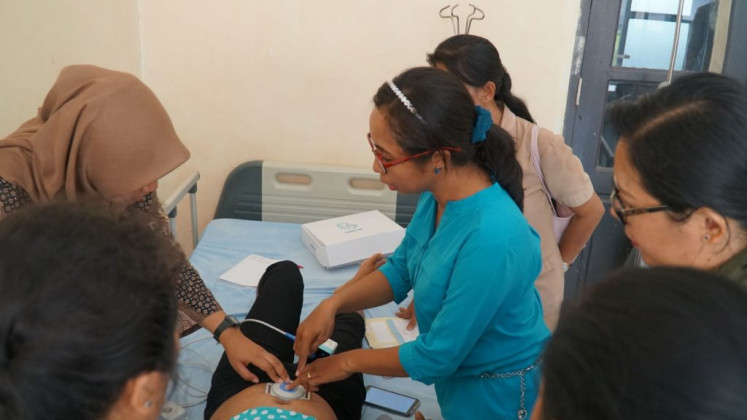Popular Reads
Top Results
Can't find what you're looking for?
View all search resultsPopular Reads
Top Results
Can't find what you're looking for?
View all search resultsWong’s ‘we first’ society: Bridging rhetoric and reality
As governments around the world are forced to reinvent themselves amid concurrent, complex waves of a changing geopolitical landscape, Singapore offers a social laboratory for observing potential shifts.
Change text size
Gift Premium Articles
to Anyone
A
mid geopolitical upheavals and intensifying rivalries, leaders today are tasked with immense responsibility. Governments are struggling to find the right balance as they grapple with trade disputes, the daunting challenges of climate change and biodiversity loss and the AI conundrum.
However, these complex shifts might bring significant improvements to our lives.
Governments are being forced to reinvent themselves, as good governance and the rule of law are no longer enough. They must rethink their operating models and become more transparent and bottom-up. Inclusion and participation are becoming paramount mantras to ensure that their citizens have a voice and role in tackling the enormous challenges ahead.
There is perhaps no better place to observe these concurrent waves of change than Singapore. Its small size, strategic location and openness make the Lion City an incredibly interesting social laboratory.
Aug. 9 marked the 60th anniversary of Singapore’s independence, and the country's developmental and economic trajectory has been a remarkable and unprecedented success, thanks to the People's Action Party (PAP), which has governed the island state since it separated from Malaysia in 1965.
The National Day Rally (NDR), delivered annually after the independence day celebration, offers its leader a crucial opportunity to address the nation.
I have great sympathy for Prime Minister Lawrence Wong, who has been in power for just over a year. He was chosen for his temperament and humility, two fundamental traits for success in the PAP.
My hope was that he would pivot the nation toward a more tolerant and open society, where dissent and criticism aren't demonized. Such a move hasn’t happened so far, but it's fair to say that no one, myself included, expected a sudden or quick shift.
This raises a critical question: Will a more gradual, step-by-step process ever take place in Singapore?
During this year's NDR speech, Wong made an important statement about the need to create a society with a collective mindset.
“To keep Singapore going, we must be a ‘we first’ society, because if everyone only thinks about ‘me’ and puts ‘me’ ahead of ‘we’, then we are finished,” he said. “Society will fray, and things will fall apart.”
But what does a "we first" society mean in practice?
People who hope Singapore will begin to prioritize basic human rights that are still ignored might be disappointed. It remains very difficult to organize events outside the PAP-endorsed mainstream system.
For example, the Transformative Justice Collective (TJC), a civil society movement with a different perspective from the PAP, organized its biennial festival TJFest in July. Though its members are often considered radical outcasts, they love their nation as much as the ruling elite. Organizing the festival was an ordeal, but it was ultimately a success.
Why do the authorities make the lives of people in organizations like the TJC so difficult? While they might claim to be simply applying the rules, we all know this issue goes beyond regulations. The rules are shaped by a system that follows a specific approach and mindset.
Wong said in his NDC speech: “We will open up more avenues for you to be heard and to get involved, not just to give feedback and share ideas but to partner us and your fellow Singaporeans, to roll up your sleeves, come up with solutions and turn good ideas for a better Singapore into reality.”
The Online Citizen (TOC), a Singapore-based media platform I have collaborated with in the past, offers a counternarrative to the prime minister’s words in its editorial on Aug. 20, listing a series of cases where the government has acted in an overtly excessive fashion, limiting and curtailing the Singaporean people’s freedom to express their opinion.
The closing section of the editorial summarizes a possible way forward for the country: “If PM Wong’s words are to be more than political theatre, the system must change.
“That means repealing laws that criminalize peaceful assembly. It means abolishing DOL declarations that financially starve dissenting media. It means ensuring that academic and artistic institutions are shielded from political interference.
“It also means applying laws fairly – without shielding the powerful or punishing critics selectively.”
It continues: “We at The Online Citizen remain committed to Singapore – to its people, to its better future. But we can only do so from afar because the civic space at home has been so systematically dismantled.
“The Prime Minister said the government should not do everything for the people. We agree. But for that to be meaningful, the people must be allowed to act without fear – and not just in harmony with the government, but sometimes in challenge to it.”
Both the TJC and TOC have been targeted by Singaporean authorities. I use the word "targeted", because in no other democratic nation would the people behind these initiatives have to endure such a heavy-handed government approach.
How might Wong react to these words? One easy option is to bury his head in the sand, ignoring the fact that many Singaporeans have differing opinions. But it would be disappointing if the prime minister chooses this convenient option. Instead, Wong should do something outside the typical PAP playbook.
If Singapore truly wants strong, "we first" governance, Wong needs to step into an uncomfortable zone and do what would be unthinkable for the traditional PAP style: Reach out to these critics and give their role legitimacy. He doesn't have to agree with their positions, but this symbolic gesture would be an act of reconciliation, opening a new chapter in Singapore’s history.
A "we first" society can only be truly resilient and strong if everyone is included, can peacefully express their opinions and pitch a different vision for the country.
I truly wish the prime minister all the best. Now he has a chance to show true leadership and go against the stream.
Happy 60th independence anniversary, Singapore!
***
The author is a freelancer who writes about human rights, democracy and regional cooperation in the Asia-Pacific.











